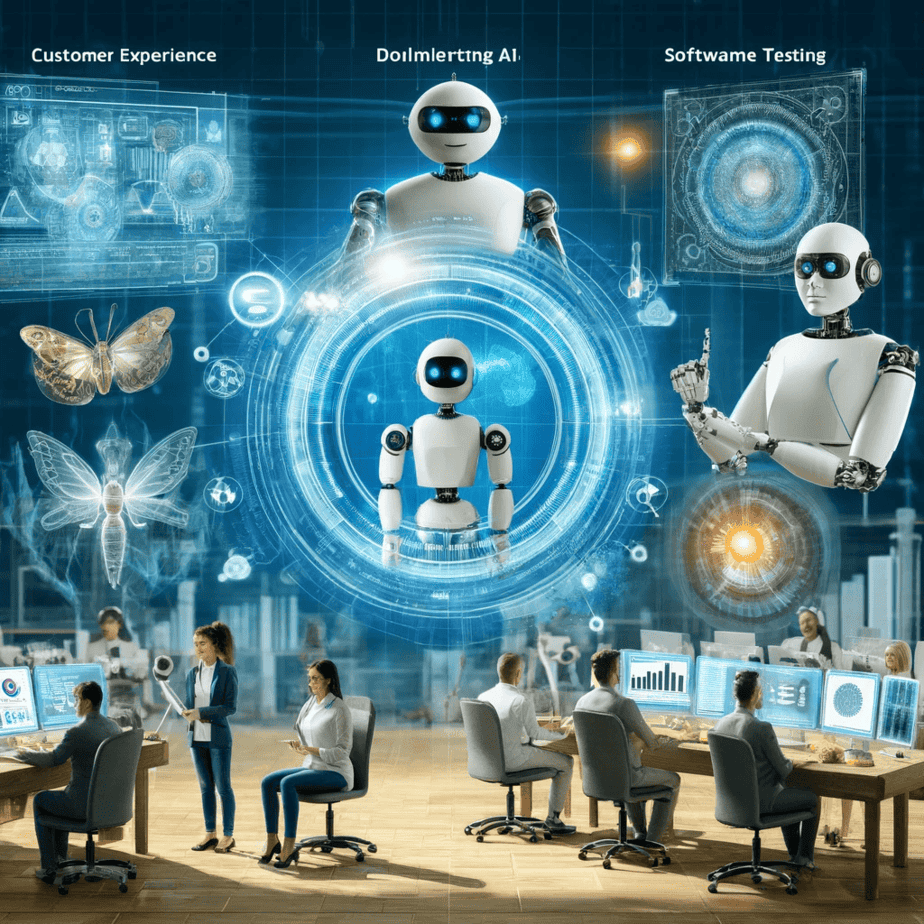How AI Is Revolutionizing CX and QA Without Replacing Jobs
Artificial Intelligence (AI) is rapidly becoming a game-changer across industries, yet many users still fear its potential downsides, particularly in areas like customer experience (CX) and quality assurance (QA) in digital testing. Concerns range from subpar results to job displacement, but AI could improve these fields without eliminating the human element.
AI in Customer Experience (CX) and Software Testing
While CX and software testing serve different purposes, they share similar risks—chief among them being job security and the quality of outcomes. In CX, many worry that AI-powered systems may not meet customer satisfaction standards and could replace human customer service agents. Similarly, in software testing, AI raises concerns about accuracy and the replacement of human testers.
According to Gartner, by 2027, 80% of enterprises will have integrated AI-augmented testing tools into their software engineering processes. Additionally, the software testing market is expected to grow at a compound annual growth rate (CAGR) of 5% from 2023 to 2027. This rapid growth has triggered fears that AI might replace human testers, which could lead to testing failures and risks in the software supply chain.
However, Tal Barmeir, co-founder of BlinqIO, an AI-powered software testing company, believes these fears are unfounded. Barmeir sees AI reshaping the role of testers, turning them into “AI-assisted testers” rather than fully replacing them. In her view, AI can augment human capabilities, allowing testers to focus on more complex tasks.
AI Enhancing Human Roles
“AI-augmented tools are excellent for handling repetitive, data-heavy tasks, which frees human testers to concentrate on more complex scenarios requiring critical thinking and decision-making,” Barmeir told TechNewsWorld. While AI is becoming a critical part of software testing, she argues that humans are still needed to interpret nuanced behaviors and make ethical decisions.
This viewpoint also applies to AI in CX. By upskilling employees to use AI tools, businesses can improve both efficiency and the overall customer experience without sacrificing human touch. In customer service, for instance, AI can handle routine queries, allowing agents to focus on more intricate or sensitive issues that require empathy and problem-solving skills.
The Power of AI in Software Testing
In the software testing industry, the integration of AI is transforming traditional methods. AI tools can automate mundane tasks, speeding up development cycles and allowing human testers to focus on areas that demand deeper insight, such as user experience and security.
Barmeir highlights that while AI can enhance efficiency, human oversight remains essential. Tools like the AI Test Recorder can capture and reproduce test scenarios, but human testers are still needed to monitor results and ensure ethical standards are met.
“Humans remain critical in understanding context and making value-driven decisions—areas where AI still falls short,” Barmeir explained.
AI in Different Sectors: Augmentation Over Replacement
The concerns about AI replacing jobs vary across industries. In some sectors, like manufacturing, AI might take over repetitive tasks. However, in fields that require creativity, interpersonal skills, or complex decision-making, AI is more likely to augment human abilities than to replace them.
For example, AI’s role in CX can be improved by using multichannel strategies that enhance transparency, personalization, and user control. Businesses can mitigate concerns about AI in customer interactions by giving users the option to choose between AI-powered services and human agents.
The Evolving Software Testing Industry
As AI and machine learning technologies continue to evolve, the software testing industry is also undergoing significant changes. Automation is becoming a key focus, helping businesses reduce time to market and respond more effectively to customer feedback.
Automation not only accelerates testing but also reduces human error. With AI, software testing can scale to handle more complex workloads, making it easier to meet the growing demands of modern businesses. However, there are still challenges, such as the need for ongoing updates and the risk of overlooking important issues during automated testing.
Despite these challenges, the future of AI-assisted testing looks promising. By lowering the barriers to entry, AI democratizes the testing process, enabling more people to participate and contribute to the industry. This broadens the talent pool and fosters innovation, making AI-assisted testing a valuable tool for both new and experienced testers.
Reshaping the Future of QA
AI is significantly enhancing the quality assurance (QA) industry by automating routine tasks and introducing tools like AI Test Recorder and Playwright. These tools streamline the testing process while maintaining high standards of quality and reliability.
The AI Test Recorder, for example, generates complete test suites with ease, while Playwright simplifies automation by allowing users to create test scripts through recorded interactions, eliminating the need for manual coding. Despite these advancements, human testers remain crucial for monitoring and interpreting results.
Final Thoughts: AI Enhances, Not Replaces
While fears of AI replacing jobs persist, experts like Tal Barmeir emphasize that AI is more likely to augment human roles rather than eliminate them. By embracing AI as a tool that enhances productivity and efficiency, businesses can improve outcomes in both CX and software testing without compromising the human element.
Thank you for reading. We hope this gives you a good understanding. Explore our Technology News blogs for more news related to the Technology front. AdvanceDataScience.Com has the latest in what matters in technology daily.



